Jimmy Greaves: One of football's most popular and enduring figures
- Published

Jimmy Greaves training with Tottenham prior to the 1967 FA Cup final, which Spurs won 2-1 against Chelsea
Jimmy Greaves, who has died aged 81, will be remembered as a prodigy, pioneer and pundit as well as one of the greatest natural goalscorers English football has ever produced.
Greaves' glittering career at club level with Chelsea, AC Milan, Tottenham Hotspur and West Ham United was matched by his feats for England as he remains fourth in the list of all-time goalscorers behind Wayne Rooney, Sir Bobby Charlton and Gary Lineker with 44 goals in 57 games.
Despite this stellar record, he will be best remembered at international level for the crushing disappointment of missing England's 1966 World Cup final win over West Germany at Wembley after failing to regain his place from Sir Geoff Hurst following an injury. Hurst scored a hat-trick in England's 4-2 win.
After retiring from the game and overcoming alcoholism, Greaves forged a hugely successful broadcasting career that cemented his status as one of the game's most popular and enduring figures.
The prodigy
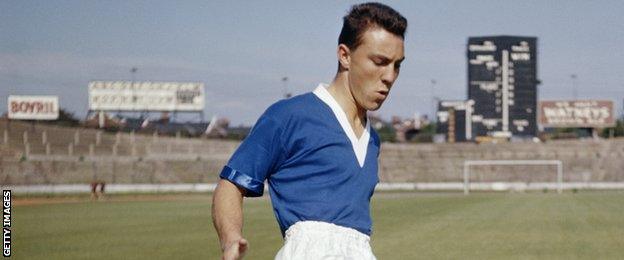
The future England legend would carve a name for himself at Chelsea aged just 17
Greaves already had a reputation as a special talent as one of 'Drake's Ducklings' at Chelsea - the name given to manager Ted Drake's group of gifted youngsters in response to Manchester United's 'Busby Babes'. He made his debut as a 17-year-old in August 1957, scoring against Spurs at White Hart Lane.
He may be best remembered for his feats at Spurs but his name is still fondly recalled at Chelsea after scoring 124 league goals in just four years at Stamford Bridge - his natural speed, poise and killer instinct in and around the penalty area breaking records.
In 1960, aged 20 years and 290 days, he became the youngest player to score 100 league goals as his feats brought him to Europe's attention.
The pioneer
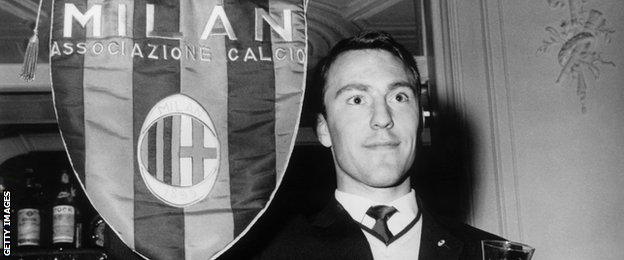
Greaves later said he left for AC Milan a boy but "came back a man" due to the tough-tackling defenders in Italy
The young Greaves was one of English football's early exports when he left Chelsea for Italy and AC Milan in June 1961 - but it was a move he made reluctantly and briefly, scoring nine goals in 14 games before returning to London just five months later.
Even in that short stint, he still demonstrated his class.
In an Italian league dominated by the Catenaccio 'door bolt' defensive system, Greaves proved he could still pick the locks with expertise, scoring goals even in the face of physical punishment.
He later said: "I always felt I went to Milan a boy and came back a man thanks to all the physical treatment I withstood from their defenders."
Scoring goals, anywhere, was never a problem but Greaves felt stifled under the austere regime of Milan's new head coach Nereo Rocco, who banned sex and alcohol for three days before matches. Greaves could not wait to return when the San Siro giants accepted bids of £96,500 from Chelsea and Spurs.
The glory, glory years

Greaves scored 220 league goals for Spurs, a club record
Greaves was on his way to Spurs in December 1961 after the League and FA Cup 'double' winners eventually outbid Chelsea with an offer of £99,999 - manager Bill Nicholson declining to pay the last pound because he did not want the striker to be burdened with the tag of being England's first £100,000 footballer.
It was worth every penny as Greaves' deeds wrote him into White Hart Lane legend, scoring a record 266 goals in 379 games in all competitions for the club.
He won the FA Cup twice at Spurs, scoring in a 3-1 win over Burnley in 1962 and playing in the 2-1 win against Chelsea in 1967.
Greaves demonstrated his quality on the wider stage as Spurs won the European Cup Winners' Cup in 1963, scoring twice as they beat Atletico Madrid 5-1 in the final in Rotterdam.
All-time England goalscorers | ||
|---|---|---|
Player | Caps | Goals |
Wayne Rooney | 120 | 53 |
Sir Bobby Charlton | 106 | 49 |
Gary Lineker | 80 | 48 |
Jimmy Greaves | 57 | 44 |
Harry Kane | 64 | 41 |
In an era renowned for hard men such as Leeds United's Norman Hunter, Ron 'Chopper' Harris at Chelsea and 'The Anfield Iron' Tommy Smith, Greaves mixed physical courage and glorious goalscoring nous that made him a striker of undisputed world class.
He scored 220 league goals in a nine-year career at Spurs, taking in 331 appearances before leaving for West Ham United in a deal involving Martin Peters that was valued at £200,000.
England highs and the lowest low

Greaves (far left) played in England's first three games at the 1966 World Cup but suffered a shin injury in the final group match against France
Greaves made his England debut in May 1959 and played in all four games in the 1962 World Cup in Chile before they lost in the quarter-final to eventual winners Brazil.
Despite his magnificent England career, which included a record six hat-tricks, Greaves will always be defined in an international context as the man who missed the 1966 World Cup final.
Greaves suffered a leg wound that needed 14 stitches after a challenge by France's Joseph Bonnel in the last group game at Wembley, allowing Hurst to come in and make history with that final hat-trick as the single-minded manager Sir Alf Ramsey refused to alter a winning team.
Greaves initially didn't receive a World Cup winners' medal, because only the 11 who played at Wembley were eligible. However, he was finally presented with one,, external along with other squad members, backroom staff and surviving families, at a Downing Street ceremony in June 2009 after Fifa changed the rules. He later sold it at a sports memorabilia auction in London for £44,000., external
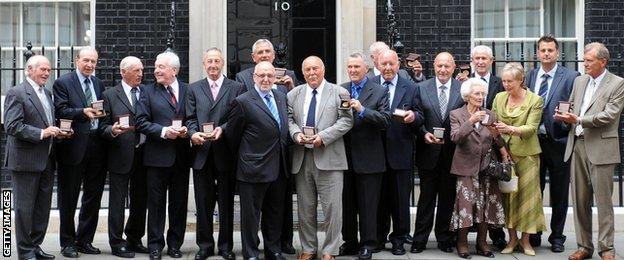
In 2009 Greaves (centre) received a medal for being part of the 1966 World Cup-winning squad - only the playing 11 were awarded them at the time
He even made his mark on the 1970 World Cup when his England career was long behind him. Greaves entered the 'London To Mexico World Cup Rally' driving a Ford Escort and finished a very respectable sixth with co-driver Tony Fall.
At the conclusion of that adventure, Greaves' great friendship with England's World Cup-winning captain Bobby Moore was illustrated when he gained entry over a wall at the British Embassy in Mexico City to see the West Ham defender. He was waiting to rejoin his team-mates after the ordeal of being falsely accused of stealing a bracelet when the team were at a hotel in Bogota, Colombia.
Leaving Spurs and the lost years
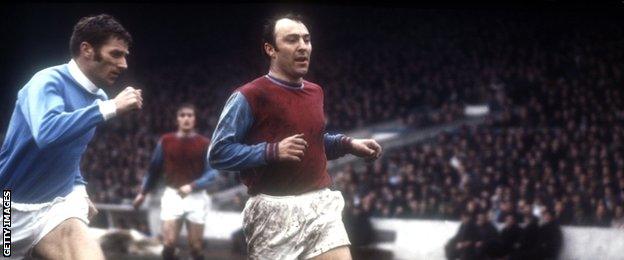
A move to West Ham in 1970 preceded Greaves' descent into alcoholism
Greaves moved to Upton Park in March 1970 and even though his best years were behind him, he still kept up his record of scoring on every major debut with two goals as West Ham beat Manchester City 5-1 on a Maine Road mudheap, an occasion preserved for posterity by the Match of the Day cameras.
The decade was also the low point of Greaves' descent into alcoholism, admitting in an interview with The Guardian in August 2003: "I lost the '70s completely. They passed me by. I was drunk from 1972 to 1977. I woke up one morning and realised that it was a different world. I'd been living in it, but I hadn't been aware of it."
Greaves, who was by then living in a one-bedroomed flat in Wanstead in east London and making a living selling women's jumpers, admitted he would drink 20 pints of beer a day, then go home and work his way through a bottle of vodka before going to bed.
In that dark spell Greaves played for Barnet, an experience he remembered fondly as he regained some of his love for the game, often reminding those who reeled off his list of clubs as Chelsea, AC Milan, Spurs and West Ham United with the affectionate words: "And Barnet."
He finally stopped drinking in February 1978 and never touched alcohol again.
The pundit
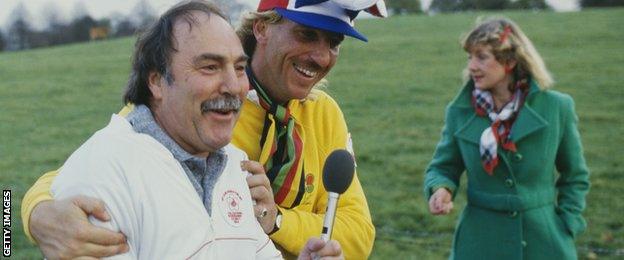
Greaves became a fan favourite as a TV pundit, pictured here joining Sir Ian Botham on a charity walk
If Greaves was popular as a player, his profile was raised even further by the unexpected and huge success of a new career as a television personality.
Now recovered from alcoholism and in good health, Greaves suddenly gained a new generation of fans as a football pundit.
Greaves acquired a following on the Midlands regional programme 'Star Soccer' then captivated the national audience as part of ITV's 1982 World Cup panel.
He appeared on ITV Sport's 'On The Ball' football magazine programme before getting his own show alongside sparring partner and former Liverpool striker Ian St John, who died in March 2021, on 'Saint And Greavsie', which ran from 1985 to 1992.
Greaves often hid his immense knowledge and perceptive observations behind light-hearted quick wit and charm, but it led to a whole new chapter in his life as the public warmly embraced his plain-speaking and humour.
He even had the honour of being lampooned on the satirical puppet show 'Spitting Image' - with his puppet standing in for him on 'Saint And Greavsie' when he was unwell in 1990. Greaves also appeared on ITV's quiz show 'Sporting Triangles'.
Jimmy Greaves - the goals |
|---|
491 goals in all competitions |
357 First Division goals (including seven hat-tricks) |
44 goals in 57 England games (including six hat-tricks) |
220 league goals for Spurs - a club record |
In later years Greaves took part in intimate speaking events and marked his 75th birthday with an event attended by Spurs greats Alan Gilzean and Steve Perryman, as well as his old playing adversary and friend, former Chelsea captain Harris.
And after years of conjecture about his absence, Greaves was finally officially inducted into Tottenham's Hall of Fame along with Perryman at a ceremony in April 2016 - the announcement having been made in March the previous year, although he was unable to attend after suffering a severe stroke in May 2015.
Apart from a testimonial game against Feyenoord in 1972, it was the first time Greaves had returned to White Hart Lane other than for his work as a pundit and to attend a memorial service for the manager who signed him, Nicholson, in 2004.
On the night before Greaves' 80th birthday on 20 February this year, Spurs celebrated the landmark when they faced RB Leipzig in the Champions League.
They produced a souvenir programme in tribute to his achievements on a night when many of Greaves' family and friends were guests of honours.
Greaves was not well enough to attend but Spurs' latter-day prolific goalscorer Harry Kane marked the occasion by presenting a gift to the great man's eldest son Danny and one of his grandchildren Hannah.
The big screen at Spurs' palatial new home flashed up some of Greaves' magic and goals at half-time - and the crowd rose just as those before them had done more than 50 years ago at the old White Hart Lane.
Greaves' ability to glide past defenders with ease, his ruthlessness and his knack of being able to pass the ball into the net did justice to those who compare his gifts with that of modern-day superstar Lionel Messi.
It was a fitting tribute to one of the most natural goalscorers the world has ever seen - and a man who overcame personal demons to make himself a national institution in his second career on TV.
